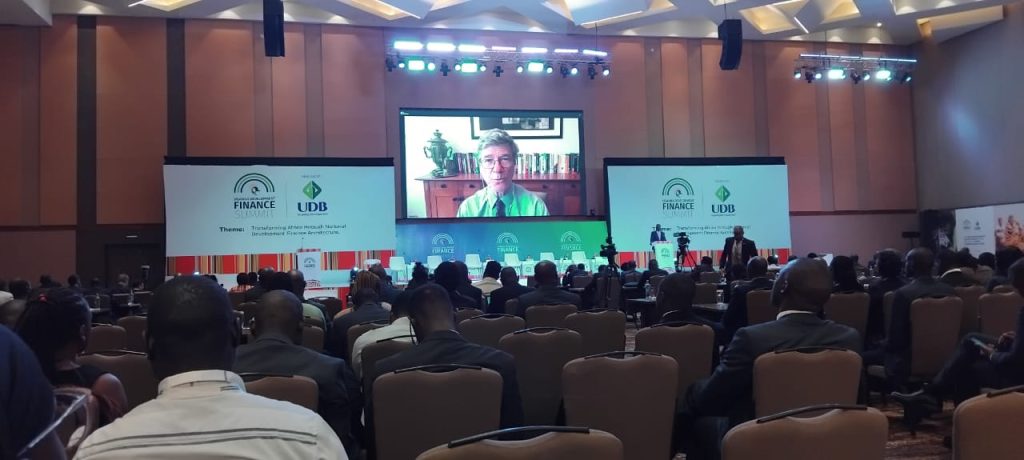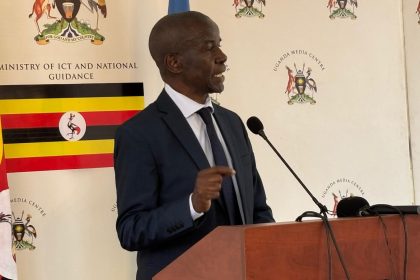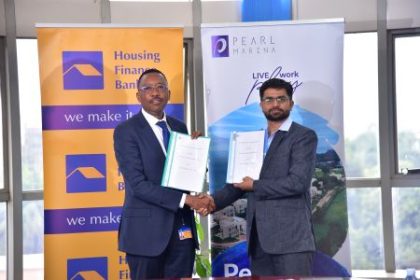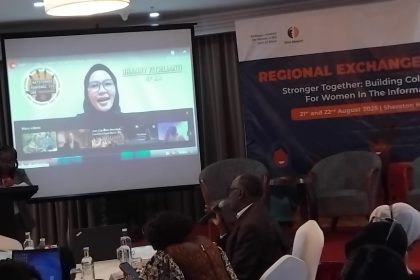Museveni calls for balanced model of infrastructure and production to drive Africa’s transformation at UDB finance summit

President Yoweri Museveni has urged African governments and development partners to forge consensus on a financing model that balances large-scale infrastructure with production-oriented social programs, saying such an approach is essential to accelerate the continent’s transformation.
Addressing delegates at the Uganda Development Bank (UDB) Development Finance Summit in Munyonyo on September 1, Museveni argued that investments in roads, power, and other infrastructure must be matched with initiatives like Uganda’s Parish Development Model (PDM), which seeks to recruit households into the money economy through micro-enterprises.
He illustrated the gap by recalling his school days in the 1960s. “When I travelled with the Ntare School cricket team from Mbarara to Soroti, all that road—over 500 kilometers—was already tarmacked. Yet the people living along it were poor. That disconnect between infrastructure and social transformation has persisted,” Museveni said.
The two-day summit, held under the theme “Transforming Africa through National Development Finance Architecture,” drew more than 400 participants, including heads of national development finance institutions, senior government officials, private sector executives, academics, and global practitioners. The gathering comes at a time when concessional aid is shrinking and African countries face increasingly costly access to global capital markets.
Museveni linked Africa’s slow progress to what he described as weak leadership. “Africa is 250 years behind Europe because many of its leaders neither have vision nor integrity. They are corrupt,” he said, stressing the need for integrated continental markets to achieve the “critical mass” required for sustained growth.
UDB Managing Director Dr. Patricia Ojangole echoed the president’s position, warning that Africa must design resilient, inclusive, and locally rooted financial systems in the face of climate change, digital disruption, shifting trade dynamics, limited fiscal space, and rising youth unemployment.
Keynote speaker Arshad Rab, CEO of the European Organisation for Sustainable Development and Chair of the International Sustainability Council, underscored the urgency of innovation. He noted that artificial intelligence already contributes 10 percent to global GDP, urging Africa to “hop on the AI highway.”
Rab added that Africa’s biggest financing challenge lies in high-risk perceptions, which inflate borrowing costs. He proposed that national development institutions engineer hybrid capital structures to deliver blended finance solutions. Microfinance, he argued, should be treated as a stop-gap measure rather than the backbone of development finance.
Addressing the summit via live link, Professor Jeffrey Sachs, Director of the Centre for Sustainable Development at Columbia University, argued that Africa’s debt is often mischaracterized. “In relative terms, Africa’s debt is actually not high. The problem is its structure, which tends to be short-term in nature,” he said, suggesting that debt restructuring and longer tenors would ease fiscal pressures and unlock growth.
By the summit’s close, a common thread had emerged: for Africa to achieve sustainable transformation, infrastructure investment must go hand-in-hand with production, innovation, and stronger development finance institutions capable of mobilising domestic and global resources at lower cost.


 Equity Bank to pitch diaspora services at UNAA Convention in New Orleans
Equity Bank to pitch diaspora services at UNAA Convention in New Orleans
 Uganda SGR construction takes off with USD 75m funding release
Uganda SGR construction takes off with USD 75m funding release
 The future of borders is smart, safe, and seamless
The future of borders is smart, safe, and seamless
 Housing Finance Bank, Pearl Marina Estates ink deal to drive affordable homeownership
Housing Finance Bank, Pearl Marina Estates ink deal to drive affordable homeownership
 Uganda Waragi scoops 3 Golds at African Marketing Confederation Awards in Accra
Uganda Waragi scoops 3 Golds at African Marketing Confederation Awards in Accra
 Women in informal sector demand recognition, protection at SIHA regional forum in Kampala
Women in informal sector demand recognition, protection at SIHA regional forum in Kampala
